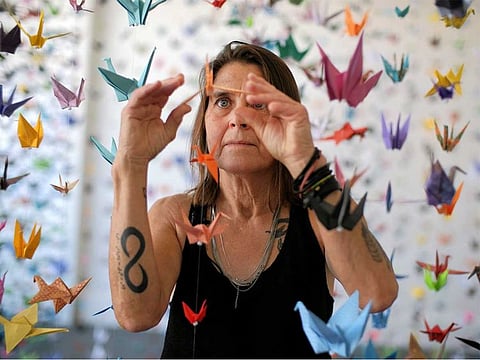The next normal after the new normal
Humanity during COVID times has seen suffering like never before

They say that it takes 21 days to cultivate a habit and about 90 days to make this habit a permanent lifestyle change. With the COVID era approaching the one-year mark, is it not tempting to wonder what habits that we inculcated and transformed into a permanent lifestyle change will continue into the post-Corona era?
We would all be in desperate need of a crash course in finding the will and the dare to close the distance and relearn some basic skills that will enable us to socialise like we humans always did. Would the teachers in this course consist of a club of people who came together under their shared belief that the virus and everything about it was a conspiracy and dared to live normal lives even through the thick of this pandemic?
The course would begin with tips and practices on greeting fellow humans at different scenarios followed by assessments and tests on the concept. Would the assessments be online or on-site?
Also Read: How to make (and break) New Year Resolutions
Also Read: The year’s stories of life and breath
Also Read: A song from the sea
Also Read: Being human during unprecedented times
An educator might consider offering the course in various programs — the rote program would include stressful memorising and taking up competitive exams that would qualify them for a degree in socialising, while the inquiry-based learning program would use a range of applications and techniques engineered to learning the concept between, across and beyond subject boundaries. Will this certificate become a necessity for job applications, dating apps and party invitations along with the vaccination confirmation stamp?
The children of the post-COVID era, who would log into online school if they wish to call in sick for the benefit of the child as well as for the greater benefit of fellow students, will get to hear tales about a time when you could feign an ache or pain if the child would like to miss a school day and weave a story of a sick grandparent if the family would like the child to miss school.
Will these children’s complaints continue to be — “Ma’am, they exchanged masks” Or “Ma’am, he is not socially distancing”?
Travelling is no easy business, for you would need to plot like a scientist breaking down every stage of your travel to consider the risks and dress up like you were on a mission to space and not just flying across countries. Will employees be granted an extra week for quarantine in addition to holidays for a safer future and will those holding a certified degree in socialising decide to apply their learning and have quarantine parties?
Security is one of the primary functions of our homes. Today our homes are where the WiFi, handwash, school, work and family are and where guests are welcomed with as much warmth as the inmates would a potential viral threat.
Future Homes could come equipped with ultraviolet lamps that will sanitise and AI to detect and signal an alarm about potential threats. Will we decide to mute Ms. Steely-Voice when we have our friends over and use Ms. Steely-Voice to raise an alarm enough to thwart the enthusiasm of the unwelcome aunt who wishes to spend the weekend with us?
Standards of hygiene and cleanliness inside homes and in public places have reached an all-time high. Will the number of germophobes exceed the number of engineers?
Masks have become our step-out-of-home accessory along with phones and wallets. Will the human ears that are currently carrying headphones, sunglasses and masks require ear-ly gym memberships for weekly sessions in strengthening?
The Pandemic would give birth to idioms like — “two vaccines a year keeps a pandemic away” or “when the going gets tough, the tough switch to online” or “pull up your mask.” Will we value the idioms — “count your blessings” and “make the best of it” better?
Humanity during COVID times have seen suffering like never before. Would we be considered the most resilient of them all?
Only time will tell.
— Pranitha Menon is a freelance writer based in Dubai. Twitter: @MenonPranitha



